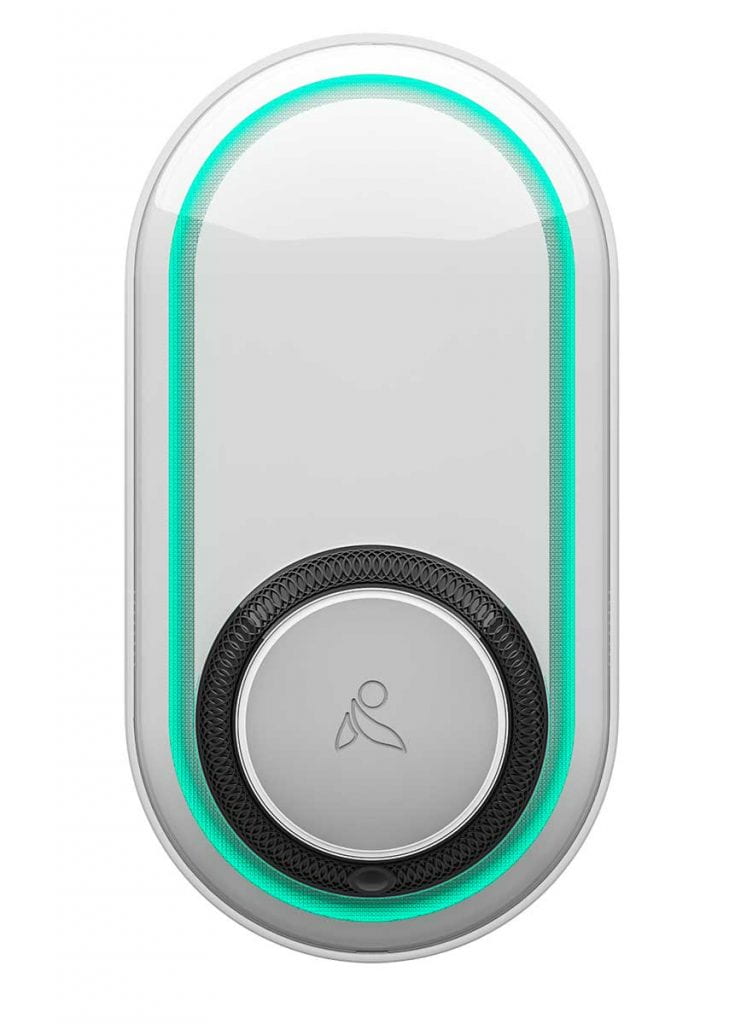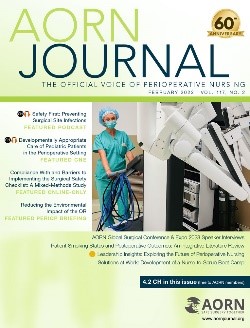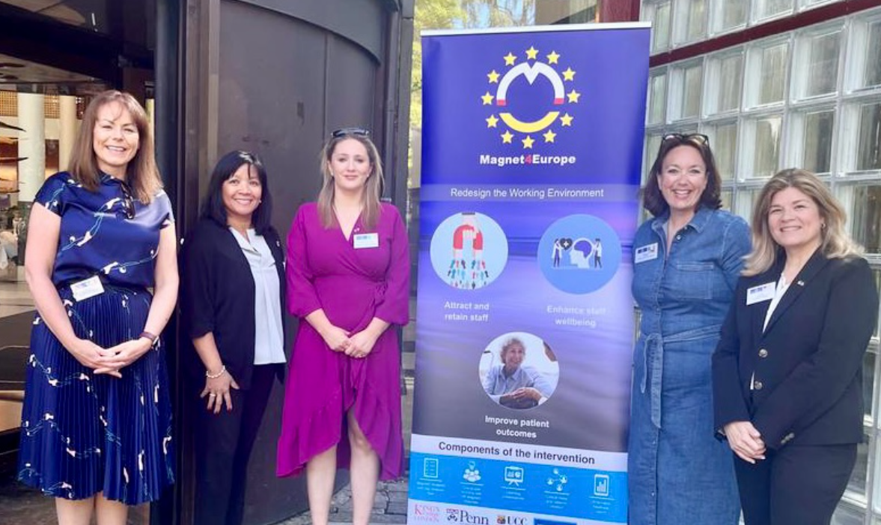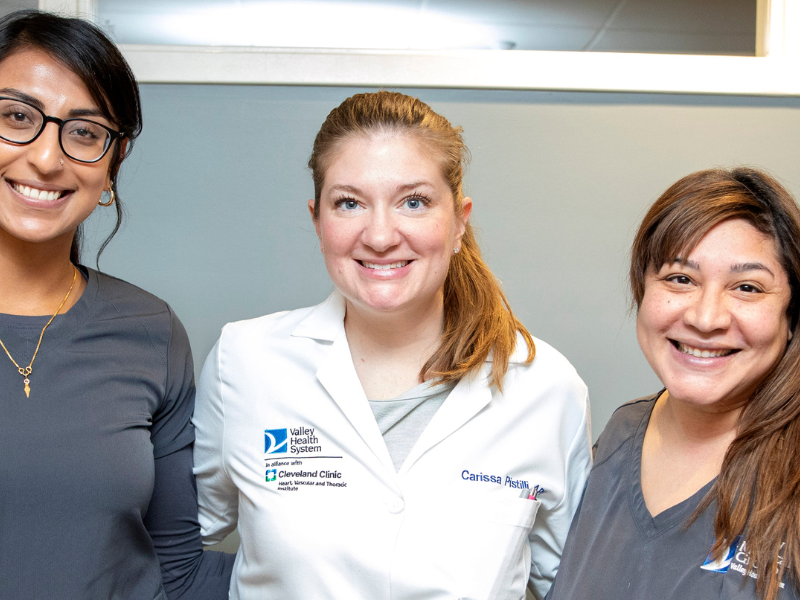NEW KNOWLEDGE, INNOVATIONS, AND IMPROVEMENTS focuses on how clinical and operational practices are based on research, evidence-based practice, and innovation.
Home Care and Population Health: Teaming Up to Improve Patient Care
In 2023, Valley Home Care (VHC) and Valley’s Population Health Department collaborated on ways to improve patient care. The partnership was a natural fit, as both entities share many patients as well as a common goal to reduce re-hospitalizations.
VHC began including Population Health nurses on team huddles when discussing common patients, and nurses facilitated case conference meetings with Population Health to discuss patients with complex health needs.
The collaboration has yielded great results, including these examples:
- A mutual patient had an issue with medication reconciliation. Population Health team members were able to use Athena to help the VHC nurse resolve this and instruct the patient on the correct medication to take.
- Another mutual patient was resistant to suggestions made by their VHC nurse. The nurse worked with a Population Health nurse, and together they were able to gain the patient’s trust and to implement important interventions for the patient to stay home safely and plan for the future.
“It’s important that we are all on the same page and work together to provide great care to patients,” said Carmen Makino, BSN, RN, Clinical Manager at Valley Home Care.
AUGi Utilization Expands
In 2023, The Valley Hospital realized significant achievements on our journey to Zero Harm and the reduction of falls with injury. The year began with augmented intelligence (AUGi) technology live on three units (Neuroscience, Bergen 3 Oncology, and Bergen 2 Surgical), and ended with AUGi live on seven units (a total of 230 beds).  Throughout the year, Patient Care Services (PCS) nursing leaders worked closely with nursing informatics, Nursing Professional Development, and Information Systems to reach the goal of implementing AUGi for more than 200 beds.
Throughout the year, Patient Care Services (PCS) nursing leaders worked closely with nursing informatics, Nursing Professional Development, and Information Systems to reach the goal of implementing AUGi for more than 200 beds.
In working closely with industry leaders, Valley’s AUGi project leads have explored the many possibilities of maximizing this novel technology. Features such as voice messaging, enhanced fall sensitivity using Valley-specific artificial intelligence (AI) training events, and redesign of the user interface continue to make AUGi a unique tool that is changing how care is delivered at the bedside.
The AUGi PCS team disseminated its findings in the Journal of Informatics Nursing, as well as a presented poster at the Institute of Healthcare Improvement, demonstrating the importance of this new technology and its impact on nursing.
A comparison of the AUGi units in 2022 versus 2023 yielded some outstanding results:
- 4A Orthopedics realized a 42% reduction in falls with injury rate, while 4E Geriatrics and 3E Cardiac saw a 35% and 27% fall with injury rate reduction, respectively.
- Overall, when comparing AUGi versus non-AUGi units, AUGi units realized a 44.5% reduction unassisted falls with injury rate.
See Related Chart: Fall Rates per 1,000 Patient Days in 2023 – Impact of AUGi
The AUGi team is excited for the transition to Paramus, with AUGi deployment across all Medical Surgical, Critical Care, CDU, ED, and the flex Med-Surg/Pediatric units.
What is AUGi?
Short for augmented intelligence, AUGi supports Valley’s fall prevention efforts through the use of an AI-driven hybrid sensor in patient rooms that passively observes patient behavior and predicts bed and chair exits – helping to stop falls before they happen.
Move 2 Improve Reduces Inpatient Falls with Injury
Maintaining mobility during an inpatient stay is instrumental to preventing hospital-acquired conditions and sustaining the patient’s baseline functional status. Patients who acquire a fall with injury during their hospital stay may see a length of stay increase of 6.3 days and an increased cost of $14,056 per admission.
With these statistics in mind, Kelly Kennedy, MSN, RN-BC, APN, FNP-C, Advanced Practice Nurse, Medical/Surgical Services, and Krystal LaNeve, BSN, RN-BC, HN-BC, Clinical Shift Supervisor, Phillips 4 East, set out to determine if an early mobility protocol could improve patient outcomes and decrease falls with injury. After reviewing current literature on mobility, they utilized evidence-based practice to design their protocol. Dubbed “Move 2 Improve,” the program was targeted to patients in the Acute Care for the Elderly (ACE) and Cardiac Telemetry units and included the following:
- Mobility rounders performed appropriate ambulation and range of motion activities with eligible patients. Mobility levels were determined using the Bedside Mobility Assessment Tool (BMAT).
- Training and education were provided to assist mobility rounders, unit registered nurses, and patient care associates in moving patients frequently during the day.
- A Mobility Rounder Report Tool was created to document patients’ mobility levels (baseline and current), activities, assistive devices, and more.
- Patients and family members were educated on the patient’s mobility level, fall risks, and the importance of contacting staff for assistance.
As a result of the Move 2 Improve protocol, both units decreased their falls with injury rates:
- ACE Unit – 45.6% reduction
- Cardiac Telemetry Unit – 69.6% reduction
In addition, both units showed an improvement in patients’ BMAT levels upon discharge.
Kelly and Krystal were invited to present their findings at the NICHE 2023 Conference in New Orleans. The pair plan to conduct additional research on the impact of the Move 2 Improve program on patients’ length of stay, plan of care, and discharge planning, as well as the impact of early and frequent mobility on patients who have a history of delirium.
Grant Helps Fund Pediatric Emergency Department Research
When parents seek mental healthcare for their children in a pediatric Emergency Department (ED), uncertainty and frustration are not uncommon. Chelsey Lupica, MSN, RN, CEN, FNP-BC, Pediatric ED Manager, and Caroline Meza, PhD, RN, CEN, NPD-BC, Nurse Scientist, sought to better understand what families experience in these situations and develop a plan for care that supports family-centered care principles.
The resulting research project, titled “The Perception of Family-Centered Care as Perceived by Families Seeking Mental Health Care in the Pediatric Emergency Department,” was launched, with a $500 grant from the ENA Foundation.
A key element of the research study is to provide resources to Valley’s nursing staff, so they may better support patients and family members. In addition, the study will examine the experience of families seeking mental healthcare in the pediatric ED and measure the effectiveness of information packets (produced with support from the grant) that aim to help family members learn what to expect throughout their child’s healthcare journey.
Code Lavender: Bolstering Support and Well-Being
It’s no secret that working in healthcare, while immensely rewarding, can also be stressful. Nurses and other healthcare workers deserve the proper support to avoid feeling isolated and emotionally compromised.
Enter Code Lavender. This program provides holistic modalities to address emotional distress and provides an outlet for employees to explore self-care, stress management, spiritual care, and self-discovery.
Valley’s Code Lavender program was developed by Jaclyn Annunziata, RN, BSN, HN-BC, Patient Flow Coordinator, Hospital Operations Resource Center (HORC); Tara Pattermann, MA, BSN, RN, HN-BC, Integrative Healing Practitioner; Josephine Bodino, DNP, RN, NEA-BC, HN-BC, Assistant Vice President, Professional Practice/PCS Finance, Patient Care Services; and Elizabeth Varghese, DNP, MHA, BSN, RN, HN-BC, Manager, Staffing Resource Center, HORC. The program launched in April 2023.
Code Lavender can be activated in response to an unexpected or traumatic event, staffing challenges, high census, and other factors. The program is open to all employees at The Valley Hospital. Once activated, the Code Lavender team – comprised of nurses from various departments, chaplains, and nursing leadership – works to deliver the support that is best for the individual(s) in need. “It’s the small things that have the biggest impact,” says Jaclyn. Modalities include:
- Breathing techniques
- Essential oils, lavender sniffers
- Affirmations
- Pet therapy, harpist
- Nutritious snacks, coffee and tea
- Inspirational stones
- M technique and Reiki
The Code Lavender team collects data and feedback to measure the effectiveness of the program, using a QR code to ask employees if they feel supported following Code Lavender intervention. Feedback has been overwhelmingly positive – so much so, in fact, that another Code Lavender program was planned to launch in early 2024 at Valley’s Kraft Center.
“They helped bring such a bright smile to my face, reminding me that even though some days can be stressful, it’s always best to stay calm and take things one step at a time.” –TVH employee
Food Farmacy Supports Patients with Diabetes
In 2023, Valley Medical Group’s (VMG) Center for Diabetes Management launched the Food Farmacy intervention for patients with poorly controlled diabetes. Using a “food as medicine” concept, the program offered nutrition interventions to help patients improve their hemoglobin A1c levels and weight. These improvements, in turn, may help reduce hospital readmission rates, improve medication adherence, and avoidable ED visits; as the patient’s diabetes control improves, they may also require less dependence on medications.
Eligible patients included those with most recent hemoglobin A1c levels between 8-10% who were open to making diet and lifestyle changes; able to use a smartphone or computer for virtual visits; and willing to undergo testing and measurements (A1c, vital signs, and weight) at the program’s start and completion.
Food Farmacy Options
- “Modify Health” Food Intervention – In this option, nutritious, ready-to-eat meals were delivered weekly to patients’ homes for 10 weeks, and a nutritionist visited patients every two weeks. The goal was to help patients become self-sufficient in planning, shopping for, and preparing healthy meals, while also being able to make healthy choices in any environment. Sixty-three patients were enrolled in the Modify Health food intervention.
- “Eat Smart, Move More, Weigh Less” Virtual Intervention – In this option, patients met in one-hour online group sessions each week to focus on behavior changes to overcome barriers to healthy eating and physical activity. Patients also received support from a nutritionist. Seven patients were enrolled in the virtual intervention.
Food Farmacy Findings
- Most patients gave very positive feedback for the program. Some patients experienced improved hemoglobin A1cs level and weight. Some even recruited friends or family to participate!
- The virtual-only intervention was not as popular as anticipated, but it did work for some.
- There was some program attrition due to medical conditions, patients relocating, not enjoying the taste of the healthy food, or not being able to stick to the one-hour weekly commitment for the virtual intervention.
- Patients have shared positive stories about how much the program has helped them to feel more in control of their health. One patient was able to also enroll her husband, who the team encouraged to complete a retinal photo; this identified a serious form of diabetic eye disease. Staff helped the patient receive timely follow-up with an ophthalmologist, who facilitated clearance from a cardiologist; they also helped the patient to start receiving monthly injections in his eyes to preserve vision.
- Food Farmacy staff helped patients to close a number of diabetes-related gaps, including diabetic eye exams and kidney health evaluation, while also facilitating necessary follow-up with specialists. Overall, the program helped to improve patient engagement and follow-up.
The Food Farmacy’s Future
The Food Farmacy team is analyzing data from the program to determine if there was a statistically significant improvement in hemoglobin A1c, blood pressure, and weight, while controlling for some other variables.
Since this program is not currently reimbursed by payers, we are working with payers through our value-based care initiatives to seek financial support. This will help Valley continue the program for patients with diabetes, while also expanding to additional patients, including those with maternal hypertension.
Food Farmacy team members include:
- Quality nurses and support staff
- A nutritionist
- Population Health staff
- VMG physicians and advanced practice providers
Telehealth Technology Aids in Fast Stroke Treatment
In October 2023, The Valley Hospital Stroke Center launched a telestroke program that allows Valley clinicians to connect virtually with a remote stroke neurologist, within minutes, for expert assessment that guides treatment. For patients who are experiencing acute stroke symptoms, treatments can begin right away to reduce potential disability.
Valley nurses in the Emergency Department and the Rapid Response Team play a vital role in the telestroke process, working directly with the remote neurologist as they evaluate the patient and recommend treatment.
The telestroke program was developed with key insights from nurse leaders, nurse managers and members of the ED and Rapid Response Team, who helped create workflows as well as education for nurses. Since its implementation, more than 130 patients were seen by a teleneurologist; 13 were treated with thrombolytics, and 5 were treated with thrombectomy.
Reducing OR Waste, Improving Sustainability
The healthcare sector is responsible for more than 5 million tons of waste annually – a grim statistic, to be sure, but one that hospitals, including The Valley Hospital, are seeking to change.

Bonnie Weinberg, MSN, RN, CNOR, Clinical Practice Specialist, Operating Room, and Tirso Ballesteros, MSN, RN, CNOR, Director, Perioperative Services, were interviewed and featured in “Reducing the Environmental Impact of the O.R.” published in the February 2023 issue of AORN Journal. The article discusses the different ways in which waste is generated in the OR – from single-use, disposable items to chemical sterilizing products and more – and how healthcare organizations like Valley are working to reduce the environmental impact of the OR.
Tirso, Bonnie, and Ibrahim Abouelnaga, BSN, RN, were also podium presenters at the A2023 AORN Global Surgical Conference & Expo in San Antonio Texas, in April 2023, where they presented “A Sustainable Going Green OR.”
Valley’s efforts to improve environmental performance in the OR were recognized in 2023 by Practice Greenhealth, the nation’s leading organization for sustainable healthcare, which awarded Valley its Greening the OR Recognition Award.
“At our hospital, reducing the environmental impact of the OR is part of our culture, and it comes from the top with our chief executive officer’s support of sustainability and recycling.” – Tirso Ballesteros MSN, RN, CNOR, Director, Perioperative Services
Valley Participates in Magnet4Europe Study
Magnet4Europe is a randomized trial to redesign hospital workplaces to improve mental health, well-being, and retention of nurses and physicians, and improve patient safety and outcomes. The workplace intervention is guided by the principles of Magnet Recognition and involves 1:1 twinning of a minimum of 60 European hospitals with experienced U.S.-based Magnet designated hospitals.
Valley was paired with Tallaght University Hospital, in Dublin, Ireland. In 2023, Lora Bognar, PhD, RN, APN, NE-BC, Director, Nursing Professional Development/Simulation Center, and Josephine Bodino, DNP, MPA, RN, NEA-BC, Assistant Vice President, Professional Practice/PCS Finance, had the opportunity to meet in person with our Ireland partners at Tallaght, as a requirement of the study. The visit was a successful in-person learning collaborative for the twinned hospitals.

Maternal Hypertension Initiative
Valley Health System’s Women’s Services and Cardiology Departments partnered to ensure patients diagnosed with hypertension, gestational hypertension, or severe preeclampsia receive follow-up cardiac care, heart health education, and home care, if needed.
“The cardiac team is excited and honored to partner with Women’s Health Services to bring such an important aspect of health to the forefront of our patient’s minds,” said Mary Collins, APN-BC, HN-BC, Director of Cardiac Surgery and Cardiac Specialty Services for The Valley Hospital.
